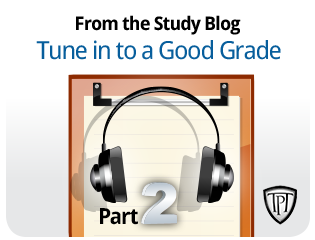
Picking the right tune
It goes without saying that picking the tune you hum best to is not a thing to do the night before your test. It’s a process of trial and error, and you need to get this figured out a few days in advance. Once you find the perfect tune, you’ll know it because your grades will reflect it.
Here’s how you find your music —
Step 1: For beginners—listen to instrumental music when you start off
Instrumental music has been proven to increase your concentration span, and songs with lyrics can actually distract you from your goal of studying. You may find yourself straying from math when the song hits the chorus and it’s all downhill from there.
Step 2: Getting better at this
Instrumental music getting a little too snoozy for you? Well, don’t slide into something too heavy and complicated, but try to replace it with some medium-paced music. This will ease into the gear change and keep increasing your attention span.
Step 3: What to avoid
Remember at all times that heavy metal music or loud bass is always going to be a no-no, no matter how good you are at studying with music. Research shows that a plant exposed to soft music blooms and flourishes whereas one exposed to heavy rock music will wither away. Over time, this applies to the human body as well, and we don’t want a burnout. Also avoid new tunes since you might start concentrating on the new tune and regurgitate that in your test rather than x+y=z.
Step 4: How to use music to your advantage
Music can be a huge help while studying, but only if you know how to use it. It will always work best if it’s played softly in the background rather than blasting, so keep that in mind when you set the music to play.
Step 5: Be consistent
You can’t jump from one kind of music to another, and one style of studying to another, and expect them all to work for you. If you’re using music while studying math then continue doing so, and if music is your companion while memorizing, then keep it to that. Don’t generalize and don’t overuse because your mind makes certain connections with certain tunes.
Always remember that you need to relax so that your brain is receptive to learning, then you can absorb as much information as possible—music smooths the way for information to enter your brain—and then rely on your memory to store it.
And the Premier Tutors can help you figure this out! So call now and get your first tutoring lesson free.


Very interesting thoughts. Recently, after reading what this blog has to say, I have been experimenting with music in the background while I do the routine e-mail checking and replying, searching for jobs as the time for graduation comes near. I feel that if you deliberately put on some instrumental music to get you going, something subconsciously complements that and does help. Or that might just be me trying to make everything work.
Thanks Omar! That’s a great point! ‘Deliberation’ is key, eventually you will get to the point where they just “happen” together – push yourself to get there! Keep up the experimenting, and best of luck in your job search!
I think for more stressful work this is even more important. I notice that while doing architecture work when no ideas come to my head, music keeps me focused while at the same time preventing me from hyper tensing!